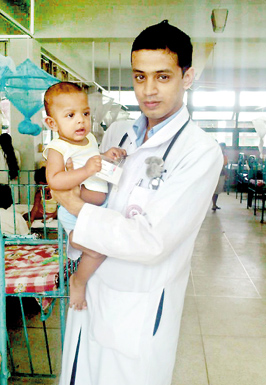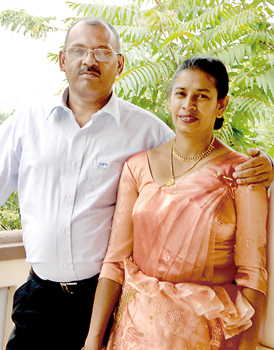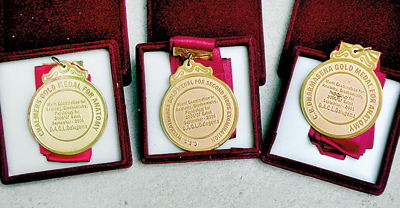A record-breaking medical trail
He had no role-model among family or friends, but his childhood yearning was fuelled by those on television panel discussions and books that he read. Following his dream to become a doctor because the healer has always been “revered and respected”, even though there were no doctors that he knew personally, Dalugama Arachchige Chamara Lakmal Dalugama has now become a role-model in his own right.

Chamara with a tiny patient during his clinicals in the Paediatric Ward, Peradeniya Hospital
Twenty-six-year-old Chamara, awaiting his internship appointment after passing the Final MBBS (Bachelor of Medicine/Bachelor of Surgery) examination from the Peradeniya Medical Faculty is a role-model par excellence for thousands of children from humble homes, with no powerful links.
His “credentials” for this esteemed role looks like the amalgamation of medals, prizes and scholarships of several very bright students. He has set a record that has not been achieved by anyone in the 50-year existence of the Peradeniya Medical Faculty.
“Stunning,” is how his academic record has been described by a senior doctor who adds that “perfect” has been his First Class on completion of his medical degree. It is not an easy task to achieve this level of academic excellence from Sri Lankan universities which have the highest standards of teaching and research work, he says.
Chamara’s results speak for themselves: 1st in the all-island Common Merit List of medical students who have sat the Final MBBS in 2013 and First Class Honours, securing Distinctions for all 13 subjects and First Classes at the three other examinations during his five years as a medical student. (See box for his achievements)
“Chamara is a mutant,” jokes a colleague when we meet them both in Colombo last Sunday, about this genius who is the “best product” so far of the Peradeniya Medical Faculty which has produced many greats in the field of medicine.
From Poramadulla, a small village in the Nuwara Eliya district, which is closer to the Kandy district boundary and Hanguranketha, Chamara’s early book-learning was from the tiny Poramadulla Kanishta Viduhala. His home background was solid, for his mother Nalani Champika was a teacher and his father Dayananda Dalugama, the Bank of Ceylon Manager at Rikillagaskada, close to their village.
“I have been called dangai,” smiles Chamara when asked about his childhood and though he did pass the Grade 5 Scholarship Examination it was not to the level expected by his teachers. Having moved to Ranabima Royal College in Kandy, he not only obtained 10 As at the Ordinary Level but also bagged the trophy as the Nuwara Eliya District Champion in chess.
The Advanced Level (AL) studies were at Dharmaraja College in Kandy and straight As (for Chemistry, Physics, Biology and General English) were his results, but Chamara admits that he didn’t work hard. “My performance was not that good,” he says, pointing out that although he came 3rd in the district and got the best results at college, his teachers had higher expectations.
He had moved from his village home to the big city of Kandy, but there was no lack of support, for he was staying with his Punchi Amma, who was like a second mother to him.

Chamara’s parents Dayananda and Nalani
From a small village school to big schools in a city and then to university, it was for Chamara an unfamiliar and literally alien environment. His dream, however, he was sure of. He wanted “very badly” to become a doctor, he liked that profession.
Getting boarded close to campus, he recalls how “it was a big challenge” in the early days to get used to university life which he entered in March 2007. He had no idea about the breadth of the medical course and it was also his first “close encounter” with eminent doctors. He kept wondering whether he could cope. When asked whether English was an issue, he is quick to answer in the negative.
Chamara explains that the five-year medical course is divided into semesters, with each semester being six months. Treading on unknown territory and feeling slightly intimidated as his 200-member batch also included the children of doctors and he felt they had an advantage over him, he decided to attend each and every lecture and study very, very hard.
He couldn’t burn the midnight oil, for he would nod off around 9.30 p.m. but he did wake up at the crack of dawn, about 3 a.m. to sit with his medical books.
At the end of the first semester, there was an examination and it was after the results that he got a measure of his potential. Seven A+s he scored, getting the maximum possible result, which was “an unexpected surprise”.
Then he got into stride, he says with not a hint of arrogance but with all humility. A meticulous time-table came next, complemented by regular attendance of lectures and scrupulous note-taking. He would go back to his boarding and study not only his notes but also other material linked to that subject.
He planned the day and the coming week “realistically”. “If you have a plan, a time-table, you can achieve anything,” says Chamara, explaining that it should not be overloaded. “There should be gaps, so that if you are not able to do something within the stipulated time, you can use the gaps for that.”
He recalls how at his dhamma school, Udalumada Sri Sudarshanaramaya, he studied up to the ‘Dharmacharrya exam’ and feels that Dhamma education helped tremendously in planning his life. In the first two years of medical school, the full concentration was on basic sciences — Anatomy, Physiology and Biochemistry. “This is the foundation,” he reiterates, adding that you have to get it right, as the clinicals which come later are built on this foundation.
Giving an insight into what happens within the hallowed halls of a medical school, he says that there are three major examinations – the 2nd MBBS at the end of two years; the 3rd MBBS at the end of four years and the Final MBBS at the end of five years.
Feeling strongly that he had disappointed his AL teachers who had high hopes of him becoming first in the island or at least first in the district, he set about fulfilling that expectation in medical school.
The routine in the first two years was 8 a.m.-12 noon lectures and then studies, while in the 3rd year clinicals were a priority. They were in the wards from 7 a.m. to 12 noon, with lectures sandwiched from 1 p.m. to 4 p.m. before going back to the wards from 5 p.m. to around midnight.
The final year, nine months in all, was “very tough”, concedes Chamara, adding that they were “living” in the wards.
While the patients were very supportive during the students’ rotation of the four specialities of Medicine, Surgery, Obstetrics & Gynaecology and Paediatrics in the final year, he is certain that the “bedside learning” medical students receive is much more important than books.
Dispelling as a bad misconception the stories that abound of university staff being prone to favouritism and nepotism, Chamara reiterates that the staff is “totally unbiased”. “They are unbiased and also very friendly and supportive,” he says, adding, “We had an excellent academic staff with Dr. Gamini Buthpitiya, the former Dean and Prof. M.D. Lamawansa, the current Dean being very efficient. The teaching programme is tough but extremely efficient.”
The Peradeniya Medical School Alumni Association (PeMSAA) also played a big role in uplifting the teaching standards of the faculty which helped me a lot, he says. He believes his success has come about due to the “contributions” of many others as well……… his faith in Buddhism since childhood and his devotion to Lord Ganesha (Ganapathy) and the support of his father, mother, sister Hansagie now in training to be a teacher (though she dislikes medicine and would run away when he showed her photos of himself in the dissection room), relatives and friends.
With emotion, Chamara talks of his mother’s free lessons to the village children in their home and how he and his sister quarrelled with her because they had less time with Amma. Her words of wisdom then had been that someday the good she was doing would come back to her own children.
The little things she did also remain etched in his memory. How even though she didn’t understand much the technicalities of medicine, she would listen with interest to him and ask detailed questions from him. During his examinations, if she was not out of their home teaching or on some other work, she would chant pirith all the while that he was at his examinations.
Now while awaiting his internship posting in mid-November to the National Hospital in Colombo, he is currently a Temporary Lecturer at the Department of Anatomy, Peradeniya Medical Faculty. What about marriage, we ask, and he says he has told his parents to find him a wife. The ideal partner would be someone in the medical field and also someone like his mother with the same values, he smiles.
With a keen interest in clinical research, Chamara who is fascinated by the mysteries of the brain and may take to neurology as a speciality, says, “It’s a complicated organ but the diagnosis of an ailment connected to the brain is very logical and rational and I find that very interesting.”
Awaiting a new and exciting chapter in his life in the premier hospital of Sri Lanka in the metropolis, there has also been some heartache for Chamara. The death of a four-year-old boy who was suffering from a genetic disease, during his clinicals, has left an indelible mark on his psyche.
Paediatrics is very rewarding when you see very ill “little” patients get better and go home, says Chamara, but in the case of this tiny boy who was very knowledgeable about his disease, there was nothing that could be done.
Achievements galore

The achievements of Chamara who ranked 1st in the All Island Common Merit List – 2013 are:
2nd MBBS – 1st Class [with a Grade Point Average (GPA) of 4, the highest that can be secured]. Distinctions in Anatomy, Physiology and Biochemistry
3rd MBBS – 1st class (GPA of 3.95). Distinctions in Pathology, Pharmacology, Microbiology, Parasitology, Forensic Medicine and Community Medicine.
Final MBBS – 1st class. Distinctions in Medicine, Surgery, Obstetrics & Gynaecology and Paediatrics.
The awards, scholarships and gold medals he has won are too numerous to mention but include the Prof. Senaka Bibile Commemoration Scholarship for Pharmacology given by the State Pharmaceutical Corporation in 2011.
A keen researcher, he has 15+ abstracts during his undergraduate career. One paper was selected as the BEST oral presentation at the 2012 Kandy Society of Medicine academic sessions and one poster as the BEST at the annual sessions of the College of Venereologists 2013.
comments powered by Disqus

